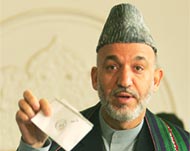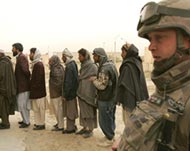Afghan ballot counting set to begin
Ballots from Afghanistan’s first direct presidential election have poured into collection centres across the country, brought by donkey, road and helicopter.

With counting due to begin on Wednesday, several rivals of frontrunner President Hamid Karzai have abandoned a boycott of Saturday’s poll over what they said were fraud and irregularities.
Another rival, a powerful general, was in Kabul to discuss his position with intermediaries.
Karzai’s chief rival, Yunis Qanuni, withdrew a boycott call on Monday, issued after suspicions were raised regarding illegal multiple voting.
The Afghan-UN Joint Electoral Management Body (JEMB) is setting up a panel to investigate.
Another main candidate, Uzbek general Abd al-Rashid Dustum, met US ambassador Zalmay Khalilzad, an influential behind-the-scenes dealmaker on Karzai’s behalf.
Poll foul-up
US President George Bush, facing his own election battle next month, has hailed the Afghan vote as a foreign policy success and hopes it can be mirrored in war-torn Iraq.
However, Afghans believe Khalilzad’s interventions are because Washington wants to avoid a foul-up in these polls before the US election on 2 November.
 |
|
US-backed Karzai is favourite to |
Agreement by Dustum to recognise the election, joining Qanuni and Hazara leader Muhammad Muhaqiq, would signal the collapse of the boycott that had undermined a vote in which millions of Afghans turned out despite threats of Taliban attacks.
The impoverished, Islamic nation has been torn by war for more than a quarter of a century and has not held any form of election since the late 1960s. It has never directly chosen a leader.
Karzai, a member of Afghanistan’s largest ethnic group – the Pashtun – was picked by the US to head a transitional government after the Taliban was ousted by US-led forces in late 2001.
An exit poll conducted by the Washington-based International Republican Institute, a US thinktank associated with Bush’s Republican party, showed Karzai heading for a landslide.
Nato forces
With more than 12,000 survey responses recorded, Karzai had more than 50% of the vote and enough to avoid a run-off with second-placed Qanuni.
 |
|
The US wants Europe to commit |
The full count is likely to take about three weeks because of difficulties in transporting ballot boxes to counting centres.
UN sources in Kandahar, once the bastion of the Taliban that ruled Afghanistan from 1996 to 2001, said counting of southern ballots may not begin for three to four days, after some boxes were found with their seals broken.
Meanwhile, diplomats said the US would urge European allies to help expand Nato’s peacekeeping forces in Afghanistan at a meeting of defence ministers starting on Wednesday.
With the Afghan election broadly free of violence, Nato is anxious to push ahead with an operation whose credibility has been hurt by the reluctance of allies to offer troops and equipment.